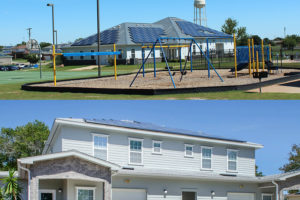The Military Housing Privatization Initiative (MHPI) partners remain strongly committed to advancing the Department of Defense’s energy security goals by increasing the sustainability and improving the energy performance at military housing communities. Working with the Service branches, housing companies leverage innovative technologies and practices from the private sector to further the Office of the Assistant Secretary of Defense for Sustainment’s goals to ensure mission assurance for our soldiers, reduce energy costs, and improve the energy resilience of domestic military installations.
Military Housing Association (MHA) member companies deploy various strategies and programs to increase the sustainability of homes and neighborhoods, including investing aggressively in renewable energy solutions, making homes more energy efficient, and following sustainable construction practices.
Here are a few examples of how the industry is improving the energy resiliency of military installations across the country while also working to strengthen national security and help maintain military readiness.
Solar Energy Initiatives
Solar energy initiatives are one way many MHA member companies are facilitating sustainability efforts on military installations. They are partnering with the Army, Navy, and Air Force on rooftop solar programs that are critical to achieving the Department of Defense’s energy security goals.
Adding solar capacity to military neighborhoods also benefits the long-term financial health of military housing projects by lowering utility costs. Those utility cost savings are then invested back into the same local communities to make improvements to housing and enhancements to neighborhood amenities like playground and pools. The energy initiatives through the MHPI are improving the quality of life for military families while making installations more energy secure. One example is the roofing upgrade at Tyndall AFB.

In Hawaii, one MHA member’s continued investment in rooftop solar at four installations, including Joint Base Pearl Harbor Hickam, now means that 15 housing communities are powered by more than 25% of solar energy, which represents a saving of nearly $3 million a year.
The scale of many solar programs on U.S. military installations often makes a sizable impact on regional energy consumption. An MHA housing partner’s solar project at Ft. Riley is the largest in Kansas, offsetting more than 30% of energy consumption for privatized military homes at the installation.
Energy Efficiency Investments & Strategies
Military housing providers invest in energy efficient systems and use environmentally sensitive construction practices to reduce the demand for energy on base. Building and renovating homes allows private sector housing companies to install more energy efficient appliances and systems, such as water heaters, furnaces, and air conditioning units. For example, the renovations underway at 85 homes at Fort Sill include the installation of energy efficient systems and Energy Star appliances. Using low-flow toilets, faucets and showers also increases the water efficiency of units.
How homes are built also consumes energy. When possible, MHA housing partners source building materials from the region and hire local contractors to decrease the environmental impact of MHPI construction projects. These strategies support the armed forces’ energy conservation goals and strengthen the local economies surrounding installations, all while reducing energy consumption.
In addition to these energy saving methods, housing providers work to employ environmentally responsible building methods during construction and renovation. Some of these methods include: recycling demolition materials to limit landfill use, re-purposing certain materials onsite such as concrete debris to reduce trucking/haul off impacts, constructing bio-swale and retention systems to filter and protect watersheds, and utilizing building materials with a high percentage of recycled or sustainable content to reduce overall carbon footprint.
Home Energy Assessments & Educational Programs
Military families are critical to the success of the DOD’s energy sustainability efforts. Families often move into homes of different sizes with varying appliances and systems as a consequence of changing duty stations frequently. That’s why housing providers offer tools and programs to educate families about how their energy consumption is impacted and how they can reduce energy usage.
Through home energy assessment programs, families can learn about their personal energy use and which appliances and systems consume the most power. If families want to learn more about conserving energy, they can go online to find tips on how to conserve a range of natural resources and even how to reduce energy use during holidays.
